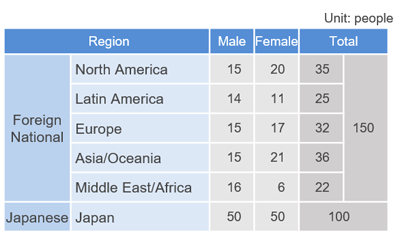- Home
- Press Releases
- 2018
- Daikin 24th Survey on Attitudes of Modern People toward Air, Survey of 150 Foreign Nationals Residing in Tokyo on "Summer Heat and Sports"
Press Releases
<Daikin 24th Survey on Attitudes of Modern People Toward Air>
Survey of 150 Foreign Residents in Tokyo on "Tokyo Summer Heat and Sports"
Expatriates Think Humidity is the Big Issue
in Tokyo Summer Looking Toward 2020
Taking Measures for Humidity to Stay Safe and Comfortable During the Hot and Humid Summer in Tokyo
3 October 2018
With the Japanese national holiday Health and Sports Day approaching on October 8, 2018, Daikin Industries, Ltd. conducted a survey for 150 foreign residents on the theme of "Tokyo Summer Heat and Sports" as part of the "Daikin 24th Survey on Attitudes of Modern People Toward Air." Implemented since 2002, this survey highlights the awareness and issues that modern people have relating to "air" and aims to promote interest among many people for "air," which is often unnoticed in daily life.
The summer for this year in Japan saw extreme heat nationwide to the extent that the Japan Meteorological Agency (JMA) expressed it a natural disaster. Attentions for outdoor sports activities have been called, resulting heat countermeasures becoming a subject for participation in summer sports. This led the Japan Sports Agency to issue comprehensive measures to prevent heat strokes during extracurricular activities and also postponement of outdoor sports competitions during times of high temperature and humidity. If Japanese people who have long-experienced Japanese summer are suffering from the heat, expatriates living in Japan must have also felt great discomfort. Last year visitors from overseas to Japan have hit a record high of 28,690,000, which trend indicates a steady rise toward the government's goal of 40 million people in 2020. Given that Japanese people themselves were unaccustomed to such severe hot weather in Tokyo, expatriates in Japan were most likely stunned by it.
Accordingly, the Daikin 24th Survey probed awareness and actual conditions relating to the "Tokyo Summer Heat and Sports" by asking questions in Tokyo to both Japanese and non-Japanese who have experienced Tokyo summer. Results showed that 59.3% of the expatriates surveyed felt uncomfortable when participating in and watching sports outdoors in Tokyo's air environment, and the prevailing reason was deeply related to humidity. Furthermore, 48.7% of the people felt that the heat of Tokyo summer was unbearably hot and cited humidity to be the main reason. These results about humidity are highly significant as a guideline for the approach Japan should take as a "hospitality country" for 2020.
In addition to the survey results, observations were compiled in the survey report from Daikin Industries, a comprehensive air conditioning manufacturer, and Dr. Hideto Tanaka, a professor at Yokohama National University and a specialist in sports physiology. Comments from not only Japanese but also Tokyo expatriates who were born and raised in a different country with a different air environment were summarized, and also advices to stay safe and comfortable when participating in and watching sports in the hot and humid Tokyo summer.
Main results of survey are as follows.
Awareness of Foreign Nationals for Tokyo Summer
"Humidity" as the major reason for the "unbearably hot" Tokyo summer 40% of the people has had heat stroke symptoms!
- Tokyo summer almost unanimously "hot" at 96.7% with nearly half 48% responding "unbearably hot"
- "High humidity" often heard for why Tokyo summer is hot (87.6%)
- Roughly 40% of the expatriates living in Tokyo experienced heat stroke symptoms in Tokyo summer (41.3%)
- Uncomfortable Tokyo summer: "Like a sauna," "commuting nightmare," "humidity and no wind only added to the exhaustion from the heat"
- Tokyo summer: "Shibuya," No. 1 "hot" spot / "shopping mall," No. 1 "cool" spot
- Expatriates advise foreign tourists visiting Tokyo to use the air conditioner
- Increased frequency and continuous operation while sleeping due to extreme heat of Tokyo summer
Foreign awareness of Tokyo summer as a place for participating in or watching sports
Is the high humidity of the air environment in Tokyo unsuitable for outdoor sports?
- Nearly 60% of the air environment "uncomfortable" for outdoor sports in Tokyo summer (59.3%)
- "High humidity" mostly often cited as "air" concern for outdoor sports (79.3%)
- Precautions for outdoor sports include "Frequently replenishing fluids" (92.0%) and "Choosing a cool time" (81.3%)
Awareness of Foreign Nationals for Tokyo Summer
Tokyo summer almost unanimously "hot" at 96.7% with nearly half 48% responding "unbearably hot"
With the extreme heat seen this year, what do expatriates think about the Tokyo summer heat? When asked, "What do you think about the Tokyo summer heat?," almost all respondents (96.7%) answered "Hot" (See Fig. 1). Moreover, nearly half (48.0%) felt that it was "unbearably hot."
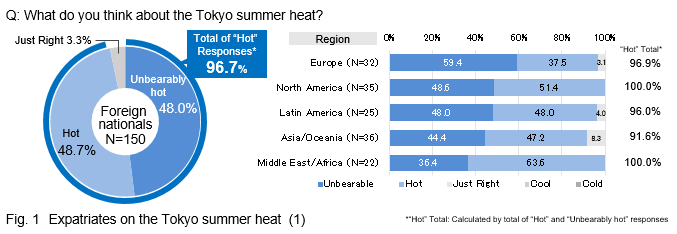
Of those surveyed, about 60% (56.7%) had some background knowledge about the Tokyo summer heat before coming to Japan. Nevertheless, approximately 80% (77.3%) responded that it was "surprisingly hotter than expected." (See Fig. 2) When looking at the expatriates coming from Asia/Oceania and the Middle East/Africa regions, there were relatively fewer people who answered, "unbearably hot," for the Tokyo summer, and many answered, "surprisingly hotter than expected." When visitors have knowledge of Tokyo's heat before coming to Japan, they may find it useful in preparations and planning for their trips. In the future, it will be increasingly more important to provide information concerning the Tokyo summer heat to foreign visitors who are considering coming to Japan.
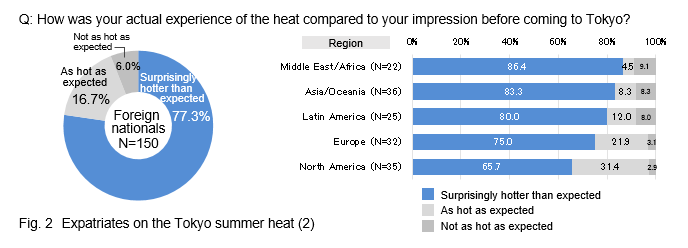
"High humidity" often heard for why Tokyo summer is hot (87.6%)
Why do expatriates think Tokyo is hot? When asked, "What reasons do you have that Tokyo feels hot (outdoors)?", about 90% (87.6%) of them answered, "high humidity." (See Fig. 3) "High temperature" was also often heard.
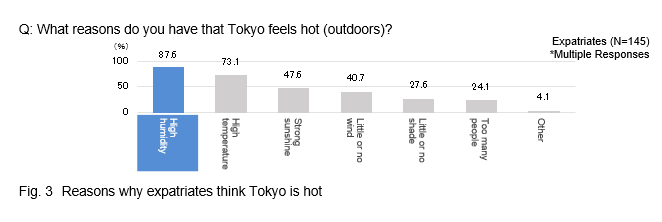
Roughly 40% of the expatriates living in Tokyo experienced heat stroke symptoms in Tokyo summer (41.3%)
- Definition of heat stroke in this survey:
- Heat stroke is a general term for difficulties for the body to adjust temperature after losing water and salt due to perspiration. In the survey, the questions were asked after clarifying all heat stroke symptoms as stated below.
- Mild condition including dizziness, fainting, muscle pain and stiffness, numbness of limbs, and irritability
- Medium condition including headaches, nausea, vomiting, fatigue, and trouble walking
- Serious condition including impaired awareness, convulsions, lack of coordination of limbs, hyperthermia, abnormal liver function, renal dysfunction, and blood clotting disorder
The extreme heat of 2018 hit the record. The number of ambulance passengers with symptoms of heat stroke in July was 54,220, which was more than twice the number of the same month in the previous year. This was the largest number recorded in a month since the survey started in 2008 and became big news. However, the actual number of people who suffered from a heat stroke would probably be higher than the number transported by emergency response units since not all people suffering from heat stroke symptoms go to the hospital. Of those expatriates suffering from heat strokes, it was uncertain how many people had previously had heat stroke symptoms in the Tokyo summer, so the survey asked expatriates, "Have you ever had heat stroke symptoms in Tokyo?" The number of Japanese people answering that they had a "heat stroke diagnosed by a medical physician" or "heat stroke symptoms but no visit to the hospital" numbered 28%, but the number of foreign nationals was around 40% (41.3%). (See Fig. 4) In particular, more than half of the foreign females surveyed (52.0%) answered that they either had a "heat stroke diagnosed by a medical physician" or "heat stroke symptoms but no visit to the hospital." The number was 20 points higher than foreign males. Even compared to Japanese females, the result was more than 20 points higher. The high temperature and humidity of Japanese summers make it particularly necessary to be aware of the signs of a heat stroke.
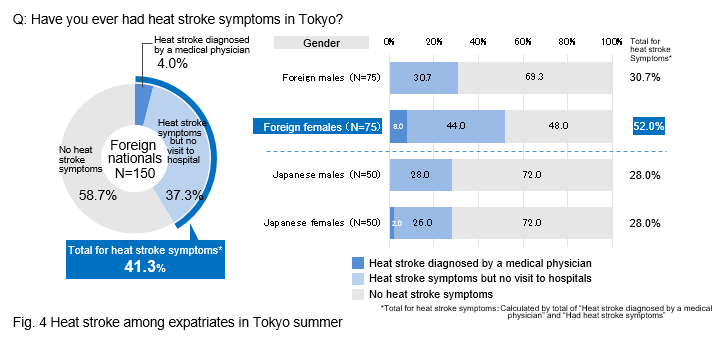
Of the 41.3% expatriates (62 people) who responded that they suffered from a heat stroke in Tokyo, 25 people reported that they havealso had a heat stroke outside of Japan, resulting in approximately 60 percent, or 37 people, answering that they had a heat stroke for the first time in the hot and humid environment of Tokyo. (See Fig. 5) In Japan, which has many natural disasters, the Japan Tourism Agency provides an application called Safety Tips that uses push notification technology to offer information such as weather and heat stroke conditions so that overseas visitors to Japan can safely travel in the country. In order for expatriates to spend a comfortable time in Japan, initiatives to disseminate information like this will become increasingly necessary in the future.
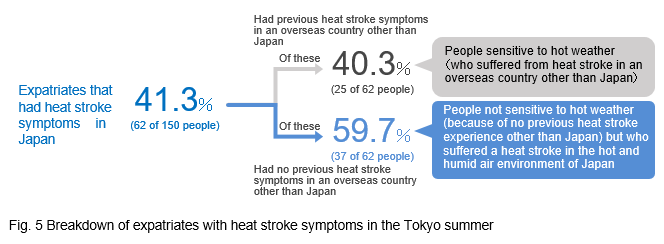
Uncomfortable Tokyo summer: "Like a sauna," "commuting nightmare," "humidity and no wind only added to the exhaustion from the heat"
The Tokyo summer is hot and humid. The survey asked expatriates to express when they have felt uncomfortable from the weather: "Please describe a time or episode when you have felt especially uncomfortable from the heat." (short answer response) Most responded feeling uncomfortable from the high humidity and the lack of wind with many recalling crowded trains, which are common in Tokyo.
- <Main expatriate responses>
-
- It is really steaming hot. I don't mind hot weather but the humidity really gets me. (Morocco /male /45 years old)
- It's so hot that it sometimes feels like a sauna. (Benin /male /36 years old)
- The humidity makes it feel especially suffocating. Commuting is a nightmare. (US /female /37 years old)
- My friend felt dizzy at the station because of the heat and almost fainted. (Philippines /male /32 years old)
- The heat was extremely bad this year. The humidity and no wind only added to the feeling of exhaustion from the heat. (India /female /29 years old)
Tokyo summer: "Shibuya," No. 1 "hot" spot / "shopping mall," No. 1 "cool" spot
The survey to expatriates aimed to determine the location of "hot" spots that symbolize the Tokyo summer heat. When asked, "Where is the place you feel hot in Tokyo during the summer? (short answer response), they most often responded "Shibuya," which was followed by "Shinjuku" and "Everywhere is hot." (See Table 1). Conversely, when asked, "Where is the place where you feel cool in Tokyo during the summer?", they most often responded "Shopping Malls/Shops," which was followed by "Parks" and "Temples/Shrines." (See Table 2). As Professor Tanaka suggests on page 6, when people are outdoors for a long time and they feel their body condition to worsen, taking a rest in indoor places such as "Shopping Malls/Shops," where it is cooled by air conditioners, helps.
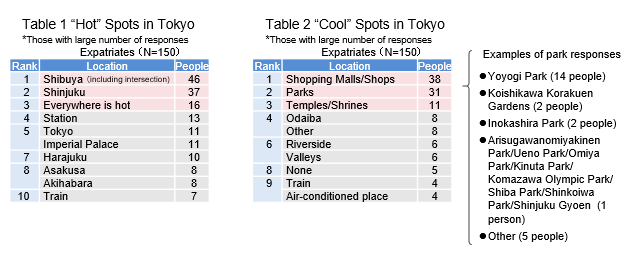
Expatriates advise foreign tourists visiting Tokyo to use the air conditioner
The survey asked expatriates who have already experienced the Tokyo summer for suggestions to newcomers: "Please provide any advice you might have to foreign visitors coming to Tokyo in the future on surviving the Tokyo summer heat." (short answer response) When asked, they responded by saying not only to prepare ahead of time such as "stay hydrated," "carry something to drink," and "clothing (light, cool material, quick drying materials, etc.)" but many of them also suggested that the most optimal way is to use the air conditioner.This suggests that the experience of Tokyo summer heat increases awareness for heat strokes. For expatriates to spend safe and comfortable Tokyo summer, some useful advice is knowing how to best utilize the air conditioner.
- <Main responses relating to air conditioners>
-
- Use the air conditioner to avoid heat stroke. Don't worry about costs. (Nigeria /male /50 years old)
- Never hesitate to use the air conditioner at home or in hotels(UK /male /36 years old)
- Use air conditioners to avoid heat stroke and do not mind the price. (Nigeria /male /50 years old)
Extreme heat in Tokyo: Increased AC operation time along with continuous operation while sleeping
To Japanese people, the air conditioner is a necessity. The survey attempts to learn whether non-Japanese people rank it the same. When asked, "Having experienced a Tokyo summer, how has your use of the air conditioner changed? (short answer response), many of the expatriates (49 people) responded by saying, "Frequency of use has increased." (See Table 3). Furthermore, 19 people said that they operate the air conditioner in continuous operation. From these responses, it seems that expatriates also rank air conditioners as a necessary product for summer in Tokyo.

- <Main responses>
-
- In Tokyo, you must turn the AC on to maintain body temperature. (Saudi Arabia /male /29 years old)
- It's worth it to use the AC all day when you are home even if the electric bill is high. (China /male /32 years old)
- I leave it running all the time even when I'm not at home. (UK /male /27 years)
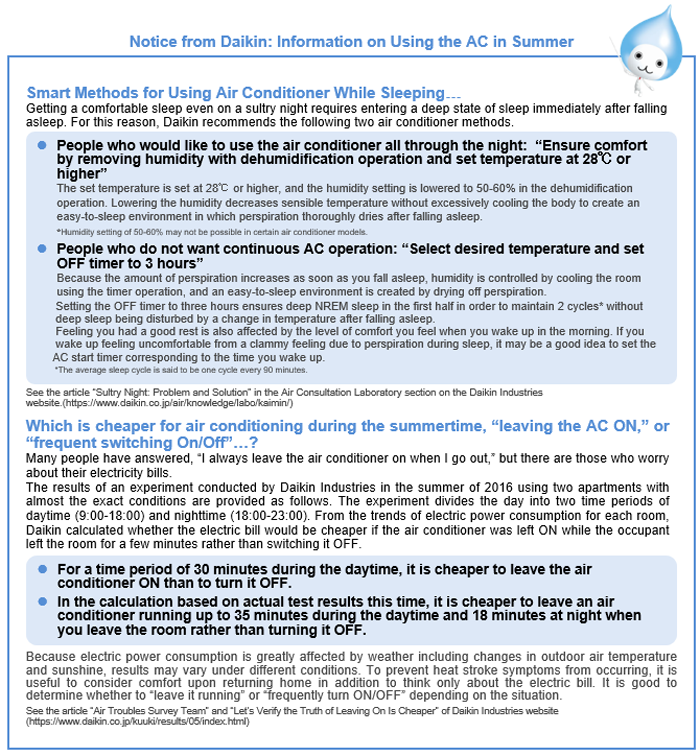
Expert's opinion (1) Ask Dr. Hideto Tanaka: "The Tokyo Heat That Expatriates Feel and Heat Strokes"
First of all, sensitivity to air such as hot, cold, and humidity is the same for everybody, right?
- Actually, air sensitivity depends on race along with the region you were born and raised.
- Generally speaking, your body gets rid of heat and adjusts its temperature by perspiring and having that perspiration evaporate from the skin. However, people living in regions that are not particularly hot, such as in Europe and the United States, there are relatively few opportunities to perspire on a daily basis. For this reason, their bodies cannot effectively regulate body temperature by perspiring in severe environments such as the high heat and humidity in Tokyo. That may be one reason Western people are often seen wearing short sleeves in Tokyo during winter. The metabolic rate of Western people maintains a high body temperature, and it is thought that they feel the heat in the Tokyo summer more than Japanese people.
Please explain the circumstances and issues in which Japanese and non-Japanese people differ concerning understanding of heat strokes and prevention awareness.
- Even if not much is known about heat strokes, non-Japanese people living in hot region countries have heat countermeasures rooted in their daily lives such as making sure to drink lots of fluids. However, in European cities such as London and Paris, where summer temperatures rarely rise beyond 30℃ at their highest, the awareness to prevent heat stroke is not as high as Japanese people because the temperature is not sufficiently hot enough for heat strokes to frequently occur.
- Because the summer temperature in Japan often exceeds 35℃ and the humidity is high, the air temperature becomes a higher risk for heat stroke to foreign visitors than Japanese people. In this survey, approximately 40 percent of foreign nationals experienced heat stroke symptoms in the Tokyo summer, and 60 percent of them experienced a heat stroke for the first time. Heat stroke prevention can be achieved by having a proper awareness. Providing even greater information and education relating to the hot and humid Tokyo summer and the risk of heat strokes can be said to be the challenge for year 2020.
Are there measures against hot heat and heat stroke that are effective in air environment with high temperature and humidity like the summer in Tokyo?
- When at home, there are cases when the indoor and body temperatures rise without notice as the outdoor temperature rises, and the risk of heat stroke risk increases. To prevent heat strokes, the recommended method for resetting the body temperature is a cold shower. People who dislike taking showers can save water in a bucket or sink and soak their arms from hand-to-elbow for a few minutes. The point is not to use ice water. When the water is too cold, blood vessels contract and body temperature is less likely to escape outwardly. Water temperature should be 10 ℃ or higher.
- When moving about outdoors, it can be effective for a person to rejuvenate by stopping at an air-conditioned shopping mall or shop. However, going outside and becoming active soon afterward when the body has cooled down can result in a temporary drop in blood pressure and cause a person to feel light-headed (heat syncope). When going outside from an air-conditioned environment, be sure to allow for some adjustment time by staying in the shade before becoming active.
Please explain how to effectively use the air conditioner in the Tokyo summer.
- Because humidity is high and difficult for perspiration to dry in the Tokyo summer, it is better to create airflow inside by using an electric fan while an air conditioner is used. When the wind of an air conditioner or fan hits the body directly, it can lead to discomfort. For this reason, I think people will be more comfortable when air is greatly circulated throughout the room. It is also effective for energy savings.
- When the sultry nights continue in the extreme heat like that of this year, it is necessary to consider sleeping with the air conditioner on. Try setting the air conditioner at 27-28℃ without letting the airflow air directly hit your body and cover yourself with a light futon or terry cloth sheet. Comfort improves further when you slightly open the bedroom door and allow the gentle air into the room.
Expert opinion: Dr. Hideto Tanaka (Associate Professor, Yokohama National University) *For his profile see page 10
Tokyo to foreign nationals as a place for participating in and watching sports
The summer this year in Japan had extreme heat nationwide with the average temperature from June to August setting record highs of +1.7℃ in East Japan and +1.1℃ in West Japan. Attention was given every day for prevention of heat strokes during sports and while sleeping. This high temperature trend is expected to continue even beyond October (See Fig. 6) and require heat warnings even for the autumn sports that are beginning from now. Meanwhile, the number of foreign tourists visiting Japan exceeded the previous record high for the fifth consecutive year last year (2017), and the monthly pace for 2018 of more than 15 million people in June eclipsed the total one month earlier than the previous year (See Fig. 7). With the possibility of a breakthrough for a record high of 30 million people, achievement of the Japanese government goal of 40 million people in 2020 appears likely.
Consequently, there was speculation on how expatriates feel about participating in or watching sports outdoors in Tokyo prior to the Health and Sports Day holiday.The survey asked expatriates who had experienced the Tokyo summer, "How do you feel about the air environment when you participate in or watch sports outdoors in Tokyo in the summer?"
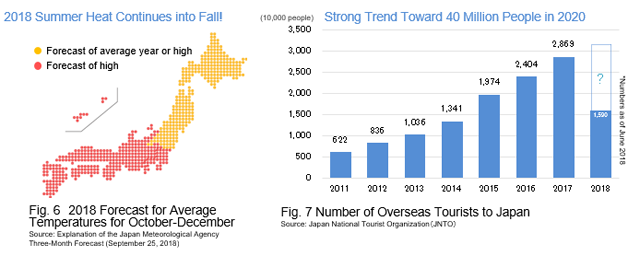
Nearly 60% of the air environment "uncomfortable" for outdoor sports in the Tokyo summer (59.3%)
About 60% (59.3%) of expatriates responded "uncomfortable" ("uncomfortable" or "somewhat uncomfortable") when asked about their degree of comfort (See Fig. 8) when participating in or watching sports outdoors. The majority thought that the air environment in the Tokyo summer was unsuitable for sports.
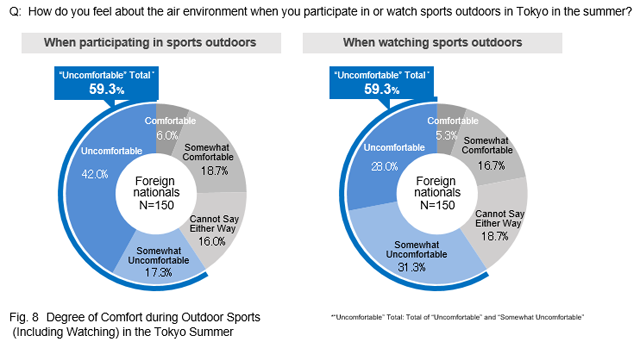
"High humidity" mostly often cited as "air" concern for outdoor sports (79.3%)
The survey sought to explain why expatriates consider the air environment "uncomfortable" when participating in or watching sports outdoors in the Tokyo summer. When asked, "What ‘air' concerns do you have when participating in or watching sports outdoors in Tokyo during the summer?", the great majority of them responded, "High humidity" (79.3%), followed by "High temperature" (65.3%), and "No wind," (46.7%). (See Fig. 9) The 2018 summer saw extreme heat, and the continuous high temperatures became big news. When participating in sports, more than temperature, most people expressed concern about the high humidity which is characteristic of Japan.
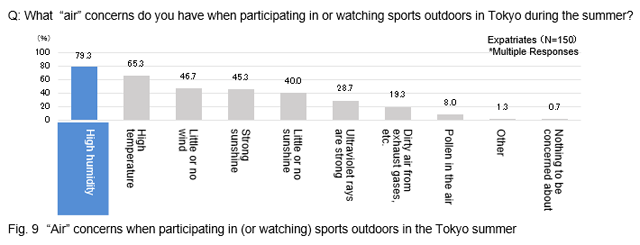
Precautions for outdoor sports include "Frequently replenishing fluids" (92.0%) and "Choosing a cool time" (81.3%)
The survey aimed to discover what steps expatriates took when participating in or watching sports in the high humidity of the Tokyo summer. When asked, "Do you take any special precautions to feel comfortable while participating in or watching sports in the Tokyo summer?", the most common response was "Frequently replenishing fluids" (92.0%) followed by "Choosing a cool time (mornings, evenings, or at night)" (81.3%), and "Applying sunscreen" (50.7%). (See Fig. 10) The response rate indicated a higher percentage of expatriates were more careful and had a higher awareness of the heat than Japanese people. However, the percentage of Japanese people who took salt as a precaution was nearly twice that of expatriates. According to Dr. Hideto Tanaka of Yokohama University, "In an air environment of high humidity, it is difficult for perspiration to evaporate from the skin. This makes it difficult to lower body temperature, causing the amount of perspiration to increase and salt in your body to deplete." This suggests that one unique countermeasure of Japanese people living in an environment of high humidity is to take salt. In Japan, foods suitable as salt supplements such as candy and beverages could help to sustain your body in conditions such as intense exercise.
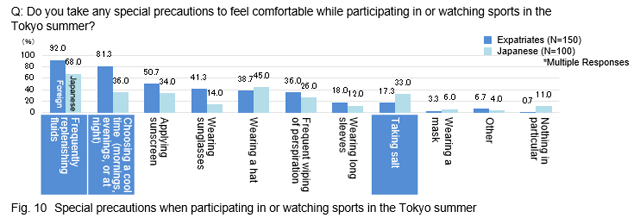
Expert's opinion (2) Ask Dr. Hideto Tanaka: "Relationship of Air Environment and Sports"
What impact does the air environment have on sports?
- Approximately 60 percent of the foreign nationals responded "uncomfortable" for the Tokyo summer as an air environment for sports. Recognizing the danger of outdoor activities during extreme heat, the Japan Sport Association (JSPO) established guidelines in "Guidebook for Prevention of Heat Disorder During Sports Activities." Heavy exercise and exercises requiring endurance are prohibited above WBGT*1 28℃ and exercise itself is prohibited above WBGT 31℃. This would further suggest that the 2018 Tokyo summer was an inappropriate air environment for sports*2.
- People are likely to be more susceptible to air composition and high temperature during sports than daily life activities. The Tokyo summer is hot and humid, and when participating in sports in places where wind is stagnant makes breathing more difficult than usual and affects your body's ability to regulate its temperature, hampering top sports performance.
- *1 WBGT:This is an index used to assess risk of heat stroke and is also called a "heat index." It is calculated from air temperatures, humidity, and radiant heat. Humidity is weighted more heavily at 70%, radiant heat at 20%, and air temperature 10% (when taken outdoors). From this, the reason for making humidity control important for heat stroke measures is clearly understood.
- *2 In the 2018 Tokyo summer (June-Sept), there were 65 days in which the temperature was 28℃ or above and 29 days within that period had a temperature of 31℃.
What was your impression of the survey results on the precautions expatriates took when participating in or watching sports in the Tokyo summer?
- The results were extremely significant in that foreign nationals residing in Tokyo had a higher awareness than Japanese people even though Japanese people are exposed to more information relating to surviving the heat, including information on heat strokes. Awareness among foreign nationals for enduring the Tokyo heat seems to have increased after coming to Japan.
- I've always recommended doing sports in the summer when it is cool like in the mornings or evenings, but survey results show more foreigners practicing that custom than Japanese people. More than being surprised at the number of foreigners, it really means that too few Japanese heed this advice. It is necessary for us to follow the example of foreigners concerning this point.
- However, you must still be aware of heat strokes even if you exercise during the cool times of morning or evenings. Although it is cooler and there is low heat from the sun, humidity is still high, so you cannot assume heat strokes will not occur. Please remember about the humidity.
What effective heat and heat stroke measures and precautions do you suggest when participating in sports outdoors in the Tokyo summer with its humidity?
- Because perspiration becomes difficult to evaporate when humidity is high, heat dissipation is reduced, and dehydration is more likely from excessive perspiration. That makes it important to rehydrate more than usual.
- Attention is also necessary for method of wiping perspiration. When perspiration is completely wiped away, heat will not dissipate from sweat. A wet towel is also cool and takes away heat from the body. Because some moisture remains on the skin, heat dissipation from the heat of vaporization can occur.
- Salt is lost from the body when sweating profusely during heavy exercise. Remember to not only replenish water but also salt too. If you exercise moderately for around one hour and eat standard meals, you would not need to take salt supplements.
Expert opinion: Dr. Hideto Tanaka (Associate Professor, Yokohama National University) *For his profile see page 10
Profile of Expert Providing Commentary
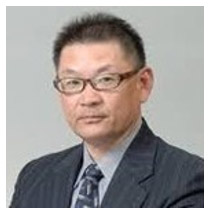
Professor, College of Education, Department of School Education,
Yokohama National University
Master Course, 1983, completed, Graduate School, Division of Physical Education, University of Tsukuba. Professor of Osaka University Medical School, Professor of Yokohama National University, Visiting Research Fellow of the University of Delaware, Professor of Education and Human Sciences, Yokohama National University from 2004. Specialty is environmental physiology (thermal environment), sports physiology.
Survey Overview
| Title | Awareness survey for "Tokyo Summer Heat and Sports" |
|---|---|
| Investigation entity | Daikin Industries, Ltd. |
| Survey Implementation | MARSH Co., Ltd |
| Survey method | Questionnaire (online survey) |
| Survey period | Tuesday, August 21, 2018 - Tuesday, September 4, 2018 |
| Survey target | 150 foreign residents in Japan (living in Tokyo from 6 months to less than 10years / with experience of Tokyo summer / average age 31.8 years) 100 Japanese residents (living over 1 year in Tokyo / with experience of Tokyo summer / average age 48.6 years old) |
| Respondents | Background of respondents as shown in the table below
|
| Reference | Composition ratio figures are rounded off and may result in the sum of composition ratios not equaling 100%. |
- Related Links
-
Visit the Contacts page for inquiries concerning the information described above.
Find out more in your region.






